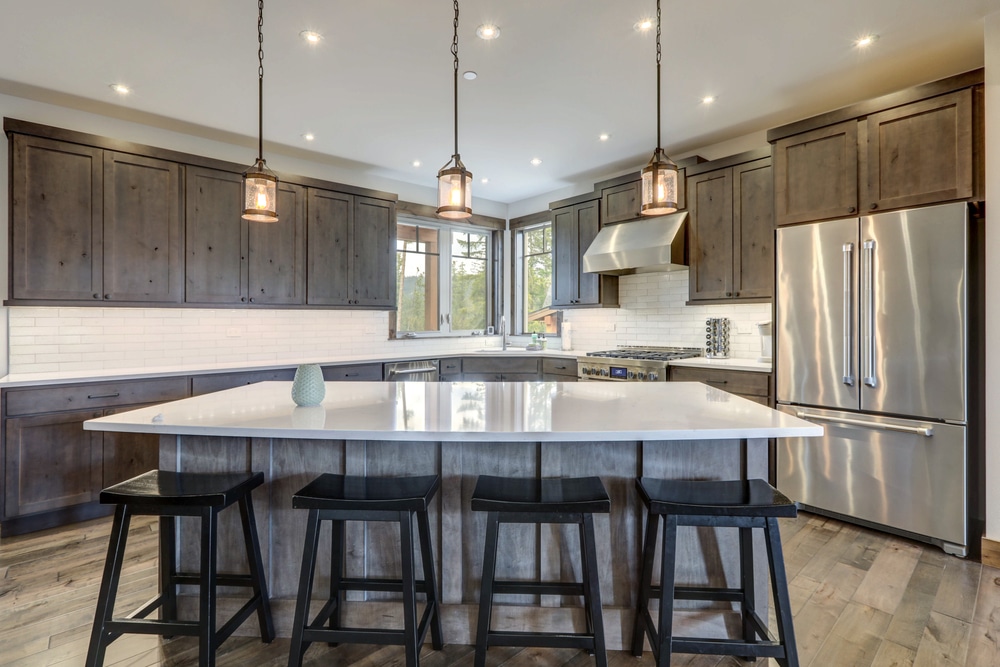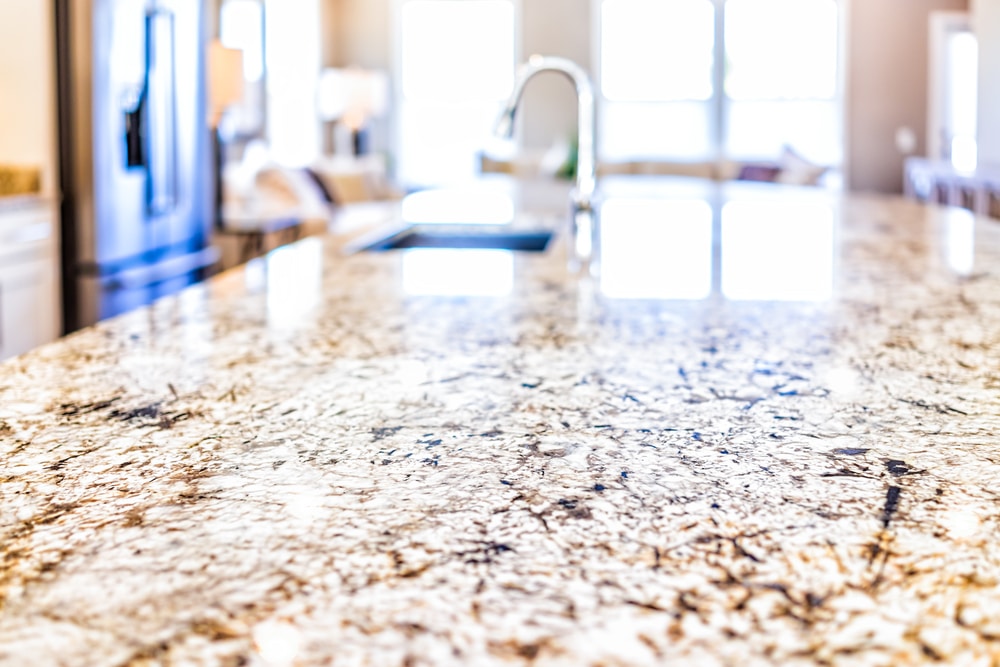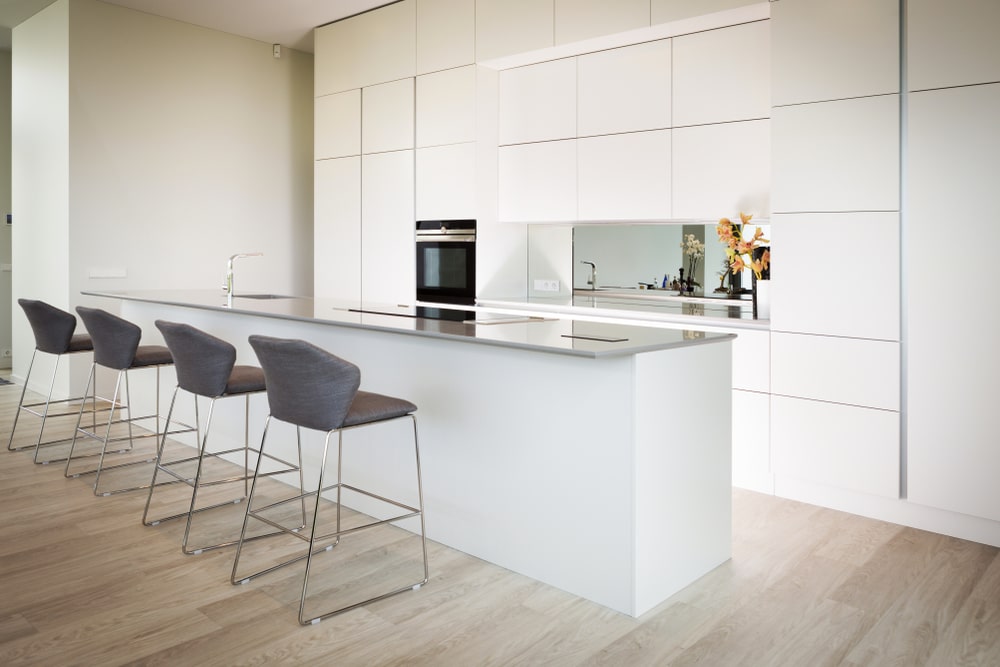The usefulness, longevity, and overall worth of your kitchen area are all impacted by the material you choose for your countertop. It’s not only about style. With so many possibilities on the market, homeowners frequently find themselves forced to compare the three most popular materials when making decisions: granite, quartz, and corian. The choosing process is both thrilling and intimidating as each of these alternatives brings an own combination of qualities, advantages, and factors to the table.
This tutorial compares and contrasts the qualities of Corian, Quartz, and Granite by focusing on the countertops, which are the focal point of the kitchen. Knowing how these materials vary is essential whether you’re remodeling your kitchen from the ground up or just updating your design. We’ll go over everything from the fundamentals of each material to its cost-effectiveness, aesthetic appeal, and upkeep needs. Through deconstructing the terms “quartz vs. granite,” defining “what is Corian,” and outlining the “difference between quartz and granite,” this article seeks to arm you with the information you need to make a selection that complements both the style of your kitchen and your way of life.
Keep reading as we examine the benefits and drawbacks of Corian, Quartz, and Granite worktops, leading you through a thorough comparison that clarifies the process of selecting the perfect material for your kitchen countertop.
What is Quartz?
One of the hardest rocks on Earth, natural quartz crystals, make up 90–95% of quartz countertops, which are engineered stone goods produced with a polymer resin. Quartz countertops have a special combination of durability and beauty because to their composition. Unlike many natural stone surfaces, quartz surfaces are exceptionally stain-resistant and do not require sealing since they are non-porous. Quartz worktops may imitate the look of genuine stone and come in a variety of hues and patterns, giving designers and homeowners a flexible color scheme to go with any kitchen style.

Advantages of Quartz Countertops:
- Durability: Quartz is incredibly durable and resistant to scratches and chips, making it ideal for high-traffic kitchens.
- Maintenance: Due to its non-porous nature, quartz does not harbor bacteria or viruses, and it’s easy to clean with just soap and water.
- Aesthetic Variety: With its engineered composition, quartz is available in a vast array of colors and patterns, including options that resemble granite, marble, and other natural stones.
- Consistency: Unlike natural stone, quartz offers color and pattern consistency, ensuring that what you see in the showroom is what you get.
Disadvantages of Quartz Countertops:
- Cost: Quartz can be more expensive than some natural stone options, making it a significant investment.
- Heat Sensitivity: While quartz is durable, it is not as heat-resistant as granite. Direct exposure to very high temperatures can damage the surface.
- UV Sensitivity: Prolonged exposure to direct sunlight can cause certain colors of quartz to fade over time, making it less ideal for outdoor kitchens.
Personal tastes, lifestyle choices, and design objectives all play a role in the decision between quartz and granite countertops. For many homes, quartz is a fantastic option because of its longevity, uniform look, and simplicity of upkeep. Granite is a more expensive option, therefore individuals who value its distinct beauty and inherent differences in stone may choose to bear this extra care.
Understanding Granite Countertops
Granite worktops have long been a popular option for both homeowners and interior designers because of its durability and inherent beauty. We’ll look more closely at granite’s composition, visual attractiveness, and pros and cons before deciding whether or not to use it in your kitchen. Granite is a unique material for kitchen worktops. To assist you in making an educated choice, we’ll also compare it to quartz, emphasizing the main differences and similarities between the two.
Overview of Granite
Because granite is a naturally occurring stone that is extracted straight from the soil, every slab is distinct in terms of pattern, color, and texture. This igneous rock’s color changes and shimmering look are mostly caused by quartz, while it also contains a variety of other minerals including mica and feldspar. Granite’s rich, organic appearance is what makes it visually appealing; it can give any kitchen a feeling of stability and beauty.


Pros and Cons of Choosing Granite Countertops
Pros:
- Durability: The hardness and scratch resistance of granite are well known. Because of its ability to endure high temperatures, it is perfect for culinary settings where hot pots and pans are frequently seen.
- Natural Beauty: Granite has unparalleled natural beauty due to its distinct patterns and color variations. Because no two slabs are same, they have a unique appearance that can improve the kitchen’s overall design.
- Enhances Value: Adding granite countertops to your house might raise its market value and attract more potential buyers.
Cons:
- Porosity: Granite is porous, which means that if it’s not sealed properly, liquids may seep through despite its resistant exterior. To stop stains and bacteria from growing, sealing must be done on a regular basis.
- Weight: Because granite is heavy, it needs strong cabinet boxes and supports, which may mean taking extra precautions during building.
- Cost: Since premium granite might be more expensive, it will require a sizable investment for your kitchen makeover.
Comparing “Granite Quartz” Aspects
It’s critical to comprehend the fundamental distinctions and similarities between quartz and granite when contrasting these two common countertop options.
- Composition: Quartz countertops are designed from natural quartz crystals mixed with resin, giving them a non-porous surface, in contrast to granite’s completely natural composition.
- Aesthetics: Because of the production process, quartz has a more uniform appearance with a larger range of color possibilities than granite, which delivers a distinct, natural look with each block.
- Maintenance: Quartz is easier to maintain than granite since it doesn’t need to be sealed. Its non-porous surface is impervious to bacterial development and stains.
- Durability: Quartz resists chipping and breaking a little better than the other material, although both are quite robust.
In conclusion, granite countertops are a great option for anyone who value the inherent beauty and distinctiveness of stone. Although they are affordable and durable, they do need a little extra upkeep to keep their look over time. On the other hand, because to its uniform appearance and non-porous surface, quartz offers a useful and adaptable substitute. Your ultimate decision between quartz and granite will probably depend on your lifestyle, personal preferences, and the particular kitchen design you have in mind.
The Basics of Corian Countertops
Explanation of “What is Corian” and Its Unique Composition
DuPont created a form of solid surface countertop in 1967 that is marketed under the name Corian. The smooth, non-porous surface is a result of the combination of natural minerals and acrylic polymer. Because of its special composition, Corian countertops can be made to order in a variety of sizes and forms, making them a flexible choice for kitchen designs. Corian countertops may be bonded effortlessly, unlike genuine stone counters, giving the illusion of a homogeneous surface free of apparent seams.
The Benefits and Limitations of Corian Counters
Benefits:
- Non-Porous: Corian is a great option for sanitary kitchen surfaces since its non-porous surface doesn’t grow mold or germs.
- Simple to Repair: Burns and scratches on Corian countertops are readily sanded away to return the surface to its pre-damaged state.
- Customizable: Corian can be made to match any kitchen’s style because to its extensive color and pattern selection. Its versatility includes seamless undermount sink installations and unique forms.
- Durable: Corian is resilient to the majority of normal kitchen wear and tear, although not being as hard as quartz or granite.
Limitations:
- Not Heat Resistant: Corian is susceptible to damage from direct heat exposure, necessitating the use of hot pads and trivets.
- Scratching Propensity: Compared to quartz or granite, this surface is more prone to scratches, albeit these may be removed with buffing.
- Cost: Corian is still regarded as a premium countertop material, so even while it’s often less expensive than quartz or granite, it might not be affordable for everyone.
Discussion on “Corian Countertops” and “Corian Counters” as Versatile Options
Corian is a highly sought-after option for anyone looking to create a unified kitchen design because of its ability to blend backsplashes and sinks together effortlessly and its propensity for practically imperceptible seams. Beyond only being aesthetically pleasing, its sanitary surface and repairability make it a sensible option for busy kitchens. Corian has the versatility to realize your idea, whether it’s a more classic kitchen design or a minimalist modern look.


Comparative Analysis: Quartz vs. Granite vs. Corian
Aesthetics:
- Quartz provides an opulent finish without the irregularities of natural patterns since it comes in a broad variety of hues and patterns, some of which even imitate those of actual stone.
- Granite is highly valued due to its inherent beauty, as every slab is distinct. This, however, may also result in variants that aren’t appropriate for every style or aesthetic.
- Although Corian cannot replicate the exact look of actual stone as Quartz can, it does provide a uniform and adaptable appearance that works well with any style.
Durability:
- Quartz is incredibly strong and impervious to stains, cracks, and scratches.
- Granite can chip if it is severely damaged and has to be sealed to prevent discoloration.
- Despite its durability, corian is more prone to heat damage and scratches, yet it is readily restored.
Maintenance:
- Because they are non-porous, quartz and corian are low care materials that only need occasional cleaning.
- Granite needs extra maintenance, such as routine sealing to keep its stain-resistant qualities intact.
Cost:
- The price of granite varies greatly, usually depending on how rare a certain hue or design is.
- Although quartz might be more expensive because to its engineering, it is frequently equivalent to high-end granite.
- Corian offers great value due to its longevity and simplicity of care, even though it is often less costly than quartz and some granites.
Silestone vs. Quartz:
One brand of engineered quartz countertops is called Silestone. Quartz crystals are combined with resins and pigments to provide extra durability and a range of colors. Although quartz is a material that includes Silestone, not all quartz countertops are Silestone. Understanding this distinction is crucial for comprehending the quartz countertop category as a whole, which has a range of brands and compositions, each of which offers special advantages and decorative alternatives.
Throughout our investigation of kitchen countertop alternatives, we have examined the unique qualities, advantages, and disadvantages of Corian, Quartz, and Granite. Renowned for its longevity and little upkeep, quartz surfaces are becoming a flexible option for contemporary kitchens, providing an extensive array of hues and patterns that emulate real stone. Granite, on the other hand, is praised for its exceptional robustness and beauty, with each slab having a distinct pattern that elevates and adds value to any kitchen. Corian offers a modern appearance and a non-porous surface that is simple to clean and maintain because to its seamless integration and customizable form.
The decision between Corian, Granite, and Quartz worktops ultimately comes down to personal taste, way of life, and kitchen needs. Quartz might be the best option if you value toughness and a contemporary look. For people who appreciate ageless elegance and are prepared to invest in its upkeep, granite is a standout material. In contrast, Corian is a good choice for anyone looking for a highly customizable, low-maintenance material with a multitude of design options.
The optimal countertop material for your kitchen will depend on a number of criteria, including your cooking style, budget, and overall house design. It’s also critical to consider how much work you’re prepared to put in to maintain the look of your countertops over the long run. It’s important to compare the cost, practicality, and aesthetics of each material to your own demands and tastes because each one offers a different combination of these elements.

